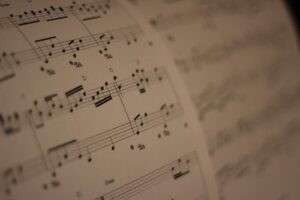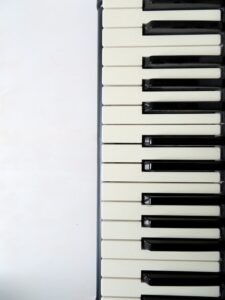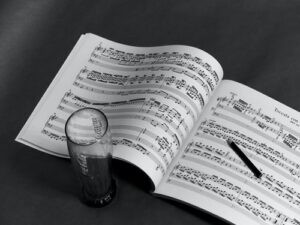Can I Learn Piano Without Reading Music? Yes, you absolutely can! While reading music opens many doors, it’s not the only path to becoming a proficient pianist. At LEARNS.EDU.VN, we believe in making music accessible to everyone, regardless of their ability to read sheet music. Embrace alternative learning methods like playing by ear and understanding chords, and you’ll be creating beautiful music in no time. Explore your musical potential with resources on auditory learning, chord-based playing, and improvisation, and discover how LEARNS.EDU.VN can help you on your musical journey.
1. Why is Reading Music Often Considered Important for Piano?
While not the only way, reading music is frequently seen as important because it provides a universal language for music. Think of sheet music as a detailed instruction manual for recreating a song. It transcends language barriers, making a musical note the same whether you’re in England, Germany, or Japan. As reported by the Music Teachers National Association (MTNA), learning to read music develops fundamental musical principles such as pitch, tempo, rhythm, and harmony.
Sheet music provides a structured framework for understanding music, allowing musicians to accurately interpret and perform compositions as intended by the composer. This is particularly valuable in classical music, where adherence to the score is crucial for maintaining the integrity of the piece. Conversely, relying solely on ear training can limit one’s ability to tackle complex scores or participate in ensemble performances where sight-reading is necessary.
The ability to read music unlocks a deeper understanding of musical theory and structure, enabling musicians to analyze and appreciate the intricacies of compositions. This knowledge enhances their ability to learn new pieces quickly and accurately, as they can identify patterns and relationships within the music. Furthermore, reading music facilitates communication and collaboration among musicians, as it provides a common language for discussing musical ideas and interpreting scores.
However, as we’ll explore, many successful musicians have thrived without this skill. You can absolutely learn piano without reading music, and LEARNS.EDU.VN is here to guide you.
2. What are the Disadvantages of Playing Piano Without Reading Music?
Even though it’s possible to excel at piano without reading music, there are some drawbacks to consider. Here’s a breakdown:
- 2.1. Difficulty Locating Pitches: Relying solely on your ear requires extensive training because musical pitch perception varies.
Some people possess “perfect pitch,” an incredibly rare ability to identify notes flawlessly. For most, developing this skill takes time and dedication. - 2.2. Challenges Building Harmonies: Harmonies are often based on mathematical relationships (intervals). Forming them by ear can be more challenging than understanding them through written music.
- 2.3. Slower Learning of New Songs: Without sheet music, learning new pieces depends entirely on replicating sounds. This can be time-consuming and potentially discouraging. As highlighted in a study by the Royal Conservatory of Music, students who learn by ear may take significantly longer to master complex pieces compared to those who read music.
- 2.4. Potential Limitations in Songwriting: While not every pianist aspires to be a composer, understanding music theory through reading opens up creative avenues that may be harder to access by ear alone.
However, don’t let these challenges deter you. With the right approach and resources, you can overcome them. LEARNS.EDU.VN offers strategies and techniques to help you succeed.
3. Who are Some Successful Pianists Who Don’t Read Music?
Many iconic musicians prove that reading music isn’t a prerequisite for piano mastery. Here are a few examples:
- Ray Charles: A legendary pianist and singer who overcame visual impairment to become a music icon.
- Stevie Wonder: Another musical genius who achieved phenomenal success without the ability to read music.
- Hans Zimmer: The acclaimed film composer behind scores like “Interstellar” and “The Lion King” has famously stated that he doesn’t read music. Zimmer emphasizes the importance of emotional connection and storytelling in his compositions, rather than strict adherence to musical notation.
These musicians demonstrate that musicality, creativity, and passion can flourish regardless of one’s ability to read sheet music.
They prove that alternative approaches to learning and creating music can be just as valid and rewarding.
4. What are the Benefits of Learning to Read Music for Piano?
While this article focuses on learning piano without reading music, it’s important to acknowledge the advantages of traditional music literacy:
- 4.1. Reduced Reliance on Ear Training Alone: Reading music provides a tangible representation of sound, clarifying the relationship between notes.
- 4.2. Enhanced Musical Knowledge: Understanding written music fosters a deeper grasp of musical theory and structure.
- 4.3. Easier Collaboration with Other Musicians: Sheet music serves as a common language for communication in ensembles and bands.
- 4.4. Efficient Rehearsals: Being able to read music streamlines the rehearsal process, allowing musicians to quickly learn and perform new pieces.
- 4.5. Time Savings: Learning to read music can significantly reduce the time required to learn new songs. Experts at Juilliard suggest that students who can read music often learn pieces in half the time compared to those who rely solely on ear training.
Even if you choose not to prioritize reading music, understanding the basics can still be beneficial.
5. What are the Potential Drawbacks of Relying Solely on Reading Music?
Interestingly, relying exclusively on reading music also has potential downsides:
- 5.1. Underdeveloped Aural Skills: Over-reliance on sheet music can hinder the development of your ability to pick up melodies and harmonies by ear.
- 5.2. Dependence on Sheet Music: You might find it difficult to play without having the written music in front of you.
- 5.3. Stifled Creativity: Strict adherence to sheet music can sometimes limit improvisation and creative exploration. Studies from the Berklee College of Music show that musicians who primarily rely on sheet music may struggle with improvisation and spontaneous musical expression.
The key is to find a balance that works for you.
6. What are the Different Learning Styles for Piano?
| Learning Style | Key Features | Suitable For |
|---|---|---|
| Visual Learners | Learn best through seeing, using diagrams, charts, and written instructions. | Those who benefit from sheet music, video tutorials, and visual aids. |
| Auditory Learners | Learn best through hearing, benefiting from lectures, discussions, and listening to music. | Individuals who excel at learning by ear, memorizing tunes, and understanding harmonies. |
| Kinesthetic Learners | Learn best through physical activity, hands-on practice, and tactile experiences. | Those who learn through movement, such as playing scales, chords, and improvising on the piano. |
| Reading/Writing Learners | Learn best through written words, enjoying reading and writing about musical concepts and theories. | Those who prefer books, articles, and written resources to deepen their understanding of music. |
| Multimodal Learners | Benefit from a combination of different learning styles, using various methods to enhance their understanding. | Those who thrive by combining visual, auditory, kinesthetic, and reading/writing methods. |






7. Can I Learn Piano Effectively By Just Learning Major and Minor Scales?
Learning major and minor scales is a fantastic starting point, even if you don’t read music. These scales provide a foundation for understanding chords, melodies, and the layout of the keyboard. According to the Associated Board of the Royal Schools of Music (ABRSM), mastering scales enhances finger dexterity, coordination, and musical understanding, which are essential for playing the piano effectively.
7.1. How Does It Work?
Understanding Basic Music Theory: Learning scales helps in understanding basic music theory concepts like intervals, chords, and key signatures.
Developing Finger Dexterity: Practicing scales regularly enhances finger dexterity and coordination, which are crucial for playing complex piano pieces.
Improving Aural Skills: Scales can be practiced by ear, which improves aural skills and the ability to recognize and reproduce musical patterns.
You’ll gain familiarity with common chord progressions found in many popular songs. It’s a practical and accessible way to begin your piano journey.
8. What are Some Top Tips For Learning to Play Piano By Ear?
Here are some effective strategies for learning piano by ear, drawing upon principles of auditory learning and cognitive skill development:
- 8.1. Learn Music in Segments: Break down songs into smaller, manageable sections (e.g., chorus, verse, bridge). Focus on mastering each segment before moving on. Experts at the Royal Conservatory of Music recommend breaking down complex pieces into smaller, more digestible parts.
- 8.2. Always Use Top-Quality Recordings and Sound: Clear, high-quality audio is essential for accurate note and pitch recognition.
- 8.3. Consider Having Sheet Music Available (As a Reference): Even if you’re not reading it, sheet music can provide clues about the number of notes, pitch changes, tempo, and time signature.
- 8.4. Hum or Sing the Melody Out Loud: Vocalizing the melody helps internalize the pitch and identify notes on the piano.
- 8.5. Use Online Resources: Numerous websites and apps offer ear-training exercises and tutorials. LEARNS.EDU.VN is a great starting point.
- 8.6. Practice Regularly: Consistent practice is crucial for developing your aural skills.
- 8.7. Record Yourself Playing: Listening back to your recordings can help you identify areas for improvement.
- 8.8. Join a Community: Connecting with other musicians who learn by ear can provide support and motivation.
9. What are the Benefits of Understanding Chords for Piano?
Understanding chords is an incredibly powerful shortcut to playing piano without reading music. Chords are the building blocks of most popular songs.
9.1. How Understanding Chords Help
Playing Songs Quickly: Knowing basic chords allows you to play numerous songs without reading sheet music.
Improvisation Skills: Understanding chord progressions helps in improvising and creating your own music.
Accompaniment: Chords enable you to accompany singers or play along with other instruments.
Focus on learning common chord progressions and inversions. Resources like the “Complete Idiot’s Guide to Music Theory” can be very helpful, available through LEARNS.EDU.VN.
10. What are Some Effective Resources for Learning Piano Without Reading Music?
| Resource Type | Description | Benefits |
|---|---|---|
| Online Tutorials | Websites and YouTube channels offer video lessons and tutorials on playing piano by ear and understanding chords. | Provides visual and auditory learning, step-by-step guidance, and the ability to learn at your own pace. |
| Ear Training Apps | Apps like “Functional Ear Trainer” and “Teoria” provide exercises to improve your aural skills and pitch recognition. | Offers structured training, immediate feedback, and the ability to track progress. |
| Chord Charts and Guides | Books and online resources provide chord diagrams and explanations of chord progressions. | Helps in understanding basic chord structures and their relationships, making it easier to play songs quickly. |
| Piano Learning Apps | Apps like “Flowkey” and “Simply Piano” offer interactive lessons that adapt to your skill level and provide personalized feedback. | Combines structured lessons with gamified learning, making the process more engaging and fun. |
| Music Theory Books | Books like “Music Theory for Dummies” and “The Complete Idiot’s Guide to Music Theory” explain fundamental concepts in a clear and accessible way. | Provides a solid understanding of music theory, which enhances your ability to play by ear and understand chord progressions. |
| Online Communities | Forums and social media groups where you can connect with other musicians, ask questions, and share tips and experiences. | Offers support, motivation, and the opportunity to learn from others. |
| Private Instructors | A qualified piano teacher can provide personalized instruction and guidance, tailored to your individual learning style and goals. | Provides one-on-one attention, customized lesson plans, and expert feedback. |
| Songbooks with Chords | Collections of popular songs with chord symbols above the lyrics. | Allows you to play songs quickly and easily, without reading sheet music. |
| Jam Sessions | Opportunities to play with other musicians in an informal setting, where you can practice improvising and playing by ear. | Develops your ability to play in a group, listen to other musicians, and respond creatively. |
LEARNS.EDU.VN offers a curated selection of these resources to support your learning journey.
11. What are Some Tips For Learning to Play Piano By Reading Music?
If you do decide to incorporate reading music into your learning, here are some helpful tips:
- 11.1. Learn the Musical Alphabet: Understanding the notes and their placement on the staff is fundamental.
- 11.2. Practice Regularly: Consistent practice is key to developing your sight-reading skills.
- 11.3. Test Yourself Regularly: Challenge yourself with progressively more difficult pieces.
- 11.4. Read Sheet Music While Listening to Songs: This helps connect the written notes with the sounds they represent.
- 11.5. Set a Regular Routine: Schedule dedicated time for practice and musical study.
12. How Can I Improvise on the Piano?
Improvisation is a key skill for any pianist, especially those who prefer not to read music. It allows you to create your own melodies and harmonies on the spot, making your playing more expressive and personal.
12.1. Steps to Improvisation
Start with Basic Chords: Learn to play simple chord progressions in different keys.
Understand Scales: Familiarize yourself with major, minor, and pentatonic scales, which provide the foundation for creating melodies.
Experiment with Rhythms: Play around with different rhythms and time signatures to add variety to your improvisation.
Listen to Other Musicians: Listen to recordings of jazz and blues pianists to get ideas and inspiration.
LEARNS.EDU.VN provides resources on improvisation techniques and exercises to help you develop your skills.
13. How Can LEARNS.EDU.VN Help Me Learn Piano?
LEARNS.EDU.VN is committed to providing accessible and effective music education for everyone. We offer a range of resources and services to support your piano learning journey, regardless of your preferred learning style or ability to read music.
- Curated Resources: We provide a curated selection of online tutorials, ear-training apps, chord charts, and music theory books to help you learn piano by ear or through traditional methods.
- Personalized Learning Plans: Our platform allows you to create personalized learning plans tailored to your individual goals and skill level.
- Expert Guidance: Connect with experienced piano teachers and musicians who can provide personalized instruction and guidance.
- Community Support: Join our online community to connect with other piano learners, share tips and experiences, and find motivation and support.
- Progress Tracking: Track your progress and see how far you’ve come with our built-in progress tracking tools.
- Affordable Pricing: We offer affordable pricing plans to make music education accessible to everyone.
14. What is the Best Age to Start Learning Piano?
There’s no single “best” age to start learning piano. It depends on individual factors like:
- Interest and Motivation: A child who is genuinely interested in learning music will be more likely to succeed.
- Cognitive Development: Children typically develop the necessary cognitive skills for learning piano around the age of 6 or 7.
- Fine Motor Skills: Sufficient fine motor skills are needed to manipulate the keys and play chords.
Adults can also successfully learn piano at any age.
14.1. Benefits of Starting Early
Cognitive Development: Music education enhances cognitive skills like memory, attention, and problem-solving.
Coordination: Playing piano improves hand-eye coordination and fine motor skills.
Emotional Expression: Music provides an outlet for emotional expression and creativity.
LEARNS.EDU.VN offers resources for learners of all ages, so it’s never too late to start your musical journey.
15. How Much Practice is Needed to Learn Piano?
The amount of practice needed to learn piano varies depending on your goals and skill level.
15.1. General Guidelines
Beginner: 30 minutes per day, 5 days per week.
Intermediate: 45-60 minutes per day, 5-7 days per week.
Advanced: 1-2 hours per day, 5-7 days per week.
Consistency is key. Shorter, regular practice sessions are more effective than infrequent, longer sessions.
16. FAQ: Learning Piano Without Reading Music
Q1: Can I really become good at piano without reading music?
Absolutely! Many successful musicians have achieved mastery without reading music. It requires dedication and the right approach.
Q2: Is it harder to learn piano without reading music?
It can be more challenging initially, as you’ll rely heavily on your ear and memory. However, with consistent practice and the right resources, it’s definitely achievable.
Q3: What if I want to learn classical music? Is reading music essential then?
While reading music is helpful for classical music, it’s not always essential. Some musicians learn classical pieces by ear or by using simplified chord charts.
Q4: What are some good ear-training exercises?
Start with interval recognition, chord identification, and transcribing simple melodies. Many apps and online resources offer structured ear-training exercises.
Q5: How can I find songs to learn that don’t require reading sheet music?
Focus on songs with simple chord progressions. Many pop, rock, and folk songs are suitable for learning by ear.
Q6: Should I still learn some music theory even if I don’t read music?
Yes! Understanding basic music theory concepts like chords, scales, and key signatures will greatly enhance your playing and improvisation skills.
Q7: How long will it take to learn piano without reading music?
The timeline varies depending on your dedication, practice habits, and learning style. With consistent effort, you can start playing simple songs within a few months.
Q8: Can I teach myself piano without a teacher?
Yes, it’s possible to teach yourself piano using online resources and apps. However, having a teacher can provide personalized guidance and feedback.
Q9: What if I change my mind and want to learn to read music later on?
It’s never too late to learn to read music! You can always incorporate music reading into your learning journey at any time.
Q10: Is there a supportive community for piano learners who don’t read music?
Yes! There are many online forums and social media groups where you can connect with other musicians who learn by ear and share tips and experiences.
Conclusion
Learning piano without reading music is entirely possible. It requires dedication, a good ear, and the right resources. Whether you choose to focus on playing by ear, understanding chords, or incorporating some music reading, LEARNS.EDU.VN is here to support you every step of the way. Visit our website at learns.edu.vn or contact us at 123 Education Way, Learnville, CA 90210, United States, or Whatsapp: +1 555-555-1212 to explore our courses and resources. Unlock your musical potential today.
Remember, the most important thing is to enjoy the process and find what works best for you. Happy playing!